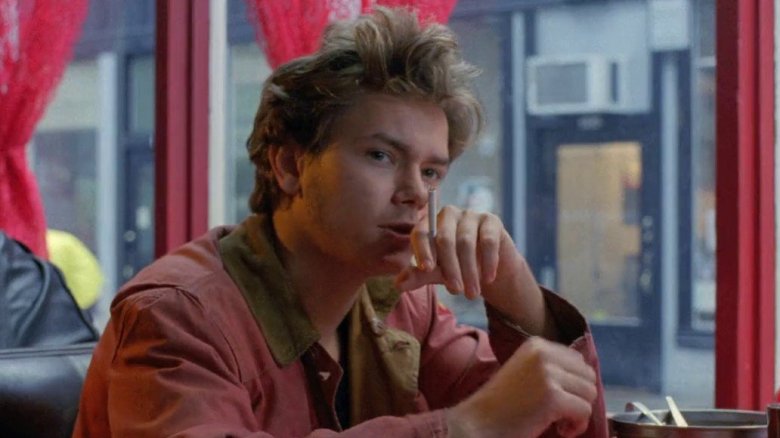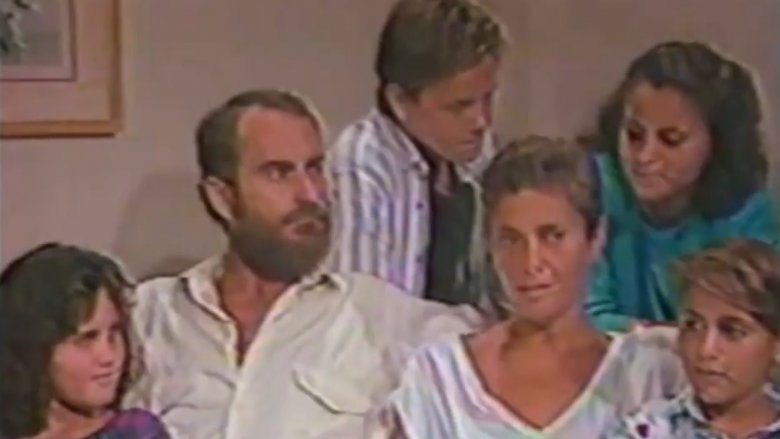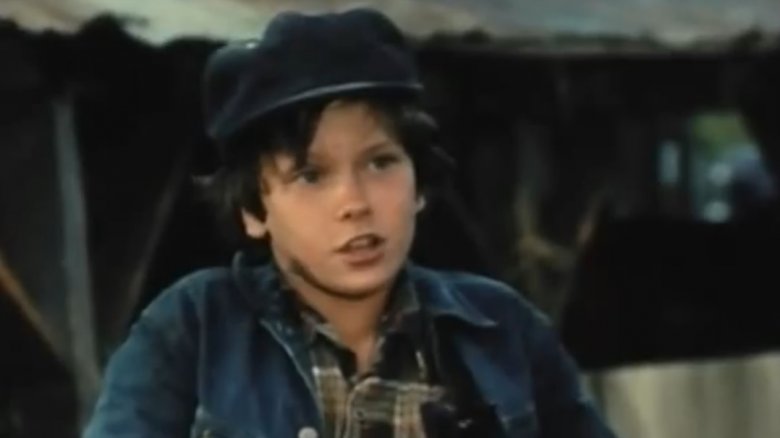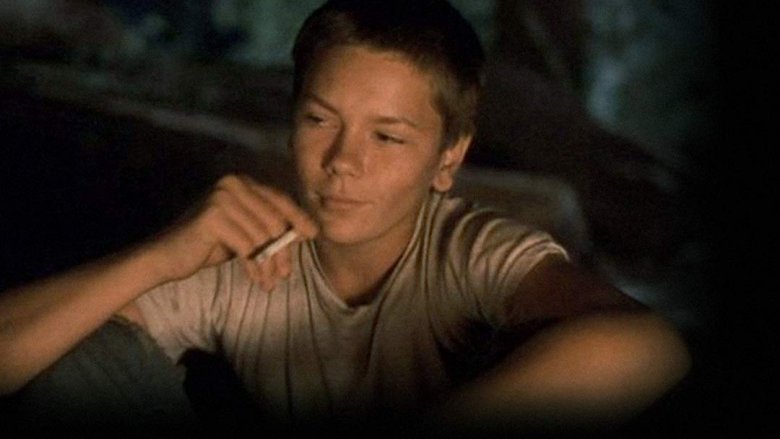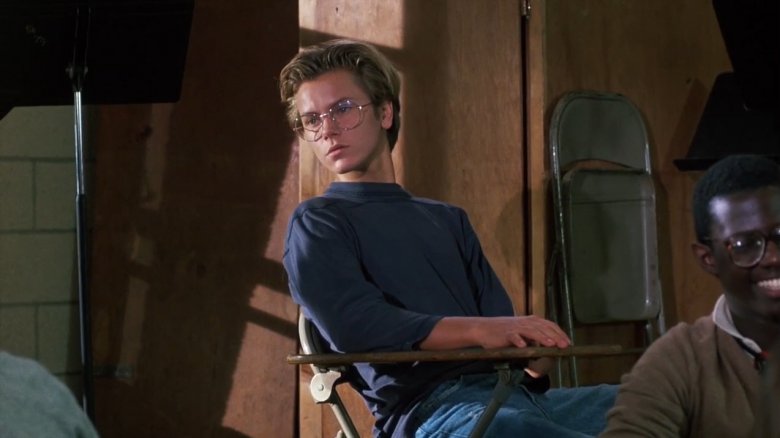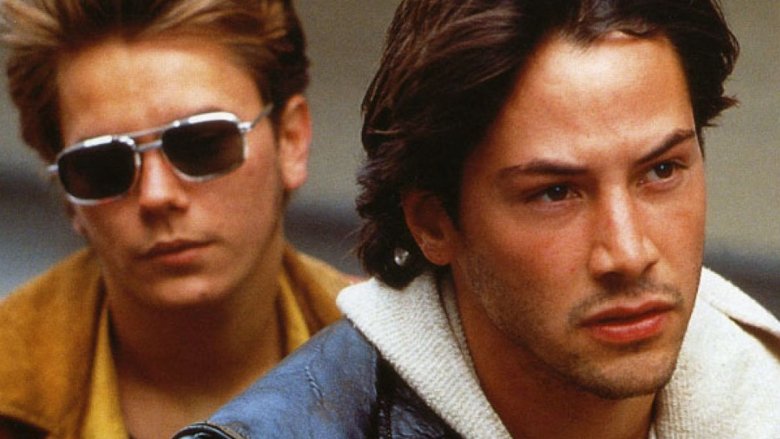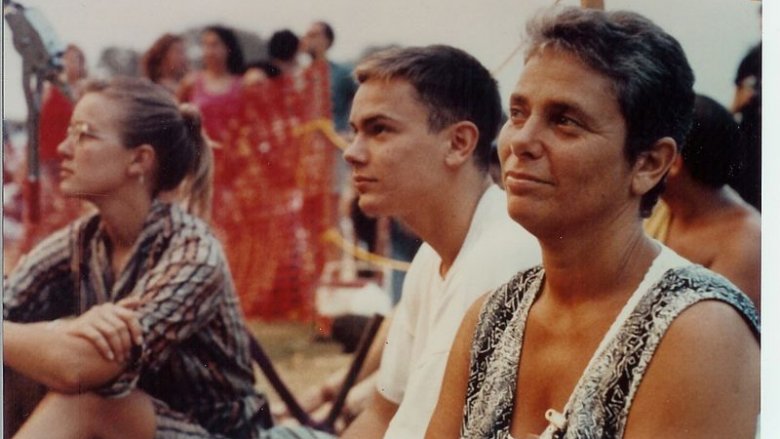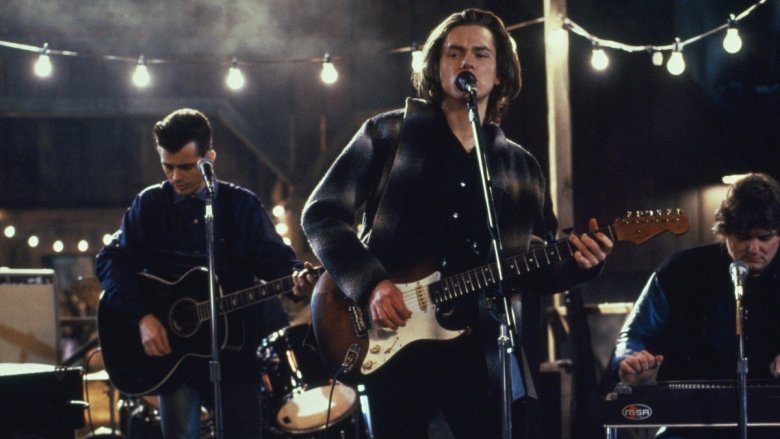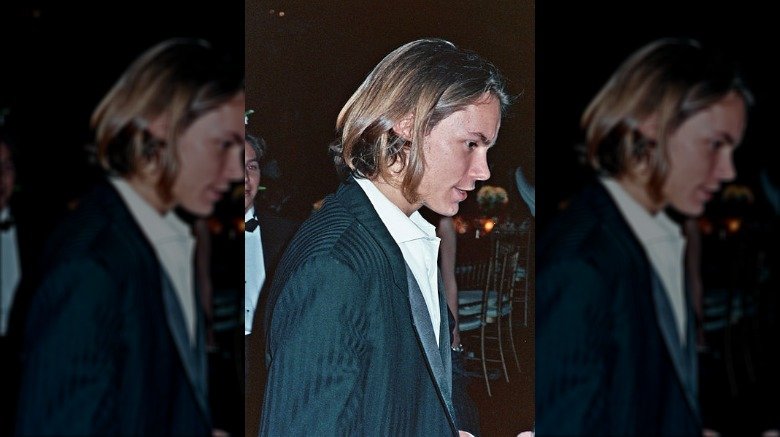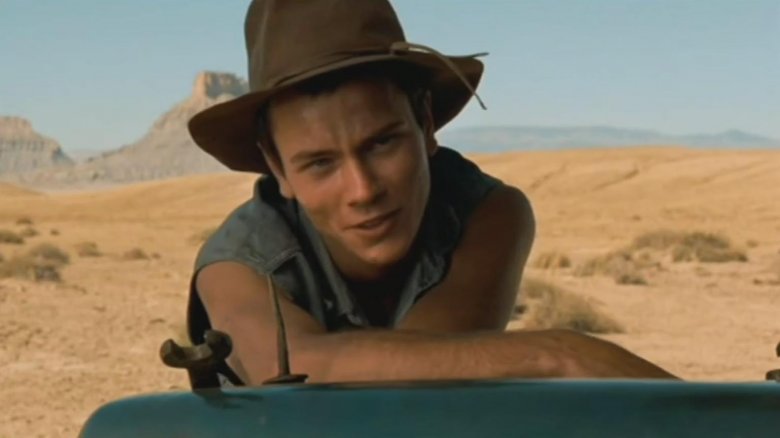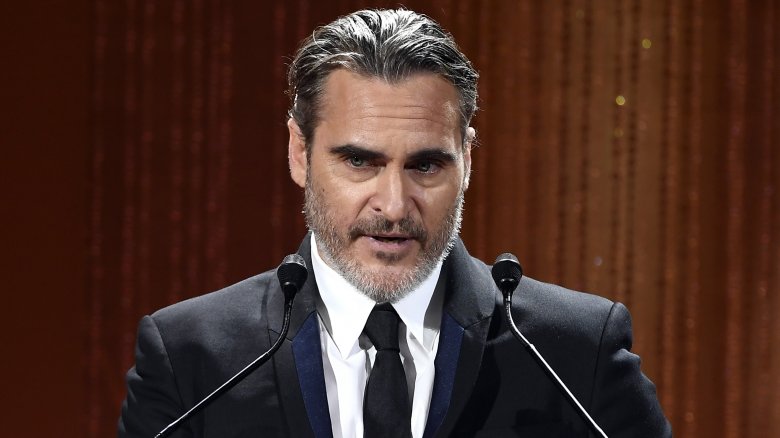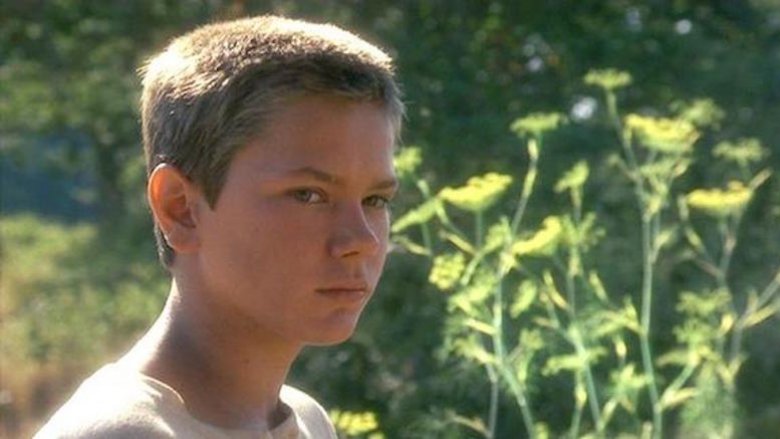The Untold Truth Of River Phoenix
We may receive a commission on purchases made from links.
Fondly dubbed "the vegan James Dean" because of his similar brooding good looks and on-screen intensity, River Phoenix was poised to be a face and voice of his generation. His soulful movie performances coupled with his real-life passion for animal rights advocacy foreshadowed the trend of celebrity social justice crusaders that's almost ubiquitous today. But tragically, Phoenix died just after his 23rd birthday on October 31, 1993, leaving behind an unfinished legacy that continues to haunt Hollywood and his dedicated fans. For many youngsters, Phoenix's death was their first experience with the loss of a beloved movie star, and for some, it was their first encounter with death at all. "This is the death of our dream," one bereaved young fan told The Independent.
However, River Phoenix's years on Earth, as brief as they might've been, were filled with music, art, and beauty as Phoenix cultivated his talents in the public eye. As an actor, dancer, songwriter, and guitarist, Phoenix was a multi-talented performer who continued to challenge himself creatively up until his passing. He also paved the way for his brother Joaquin Phoenix to settle into his own path to acting and success. But what was it that made the young actor such a compelling presence on and off the screen? Well, from his early years in a cult to his tragic death, here's the untold truth of River Phoenix.
River Phoenix's childhood in a cult
River Jude Bottom was named after the holy river in Herman Hesse's philosophical treatise Siddhartha, and his middle name is a tribute to the Beatles song "Hey Jude." Born on August 23, 1970 in Madras, Oregon, to Arlyn (who now goes by Heart) and John Lee Bottom, Phoenix was living a nomadic lifestyle immediately after birth. His parents were members of the Christian missionary group Children of God, which is now known as a notorious cult where abuses prevailed. The group encouraged pedophilia and incest, and Phoenix himself discussed having his first sexual contact when he was just four years old. He told Details magazine (via LA Weekly) that he'd blocked out the experiences and "was completely celibate from ten to fourteen."
During these turbulent years with the Children of God and his parents traveling around South America, proselytizing for the church, Phoenix's four siblings — Joaquin, Rain, Summer, and Liberty — were born. But it wasn't until the late 1970s that Heart and John became properly disgruntled with the group and its practices, and they managed to escape with the whole family back to America. Unfortunately for River, though, the events that he experienced as a child would continue to trouble him until his death. Some even argue that this traumatic foundation, and in particular the sexual abuse as a toddler and beyond, contributed to the circumstances around his eventual death.
River Phoenix's LA story
After escaping from Children of God, the Bottom family changed their name to Phoenix, a testament to the symbolic creature who rises from its own ashes. They lived on Heart's family property in Micanopy, Florida, until deciding to move to Los Angeles where she eventually got a job working for NBC. In the meantime, River and his siblings would perform music and comedy sketches on street corners to make extra money. The Phoenixes were homeless for a time, sleeping in their car around LA. When they finally got an apartment, the family of seven was living in a one-bedroom that didn't allow children. But Heart managed to leverage her administrative job with NBC to help get her children signed with famous talent agent Iris Burton, who quickly cast River in the musical television show Seven Brides for Seven Brothers. He had a prolific television career, landing major roles in several TV movies like Surviving: A Family in Crisis, which also starred Molly Ringwald, and playing Robert Kennedy Jr. in a biopic Robert Kennedy and His Times.
While River was the first to get big casting breaks in Hollywood, he always made room to bring his siblings along on the journey, and for those first few years, he felt financially responsible for his family. His screen roles always showed River Phoenix to be much older than his actual years, likely a result of the childhood trauma he survived, and taking on the personal role as another man of the house and provider was a "natural" extension of his old soul.
Stand By Me and Phoenix's big break
Stand By Me was not River Phoenix's first feature film. That would be Joe Dante's epic space adventure The Explorers, but the 1986 classic would be the film that initially defined his career and future prospects. Based on the Stephen King novella The Body, about a group of friends who hike across the Maine countryside to see a dead classmate who'd been killed by a train, Stand By Me was directed by Hollywood legend Rob Reiner and starred Phoenix as bad boy-with-a-golden-heart Chris Chambers. Phoenix brought a fierce balance of tenderness and toughness to the role that was far more mature than his years would suggest. To the Chicago Tribune, Phoenix said, "The truth is, I identified so much with the role of Chris Chambers that if I hadn't had my family to go back to after the shoot, I'd have probably had to see a psychiatrist.”
Years later, Rob Reiner would tell The Guardian, "I said to him, 'I want you to think about a time when someone, an adult who is important to you, let you down.' He nodded and went away to think for a few minutes. The next take, in which he's crying, is the one that's in the movie. He never told me what he thought about — I assumed maybe one of his parents, but I don't know. And when I watch the movie now, when he disappears at the end, it's just very, very sad."
His incredible early performances
For someone who had no formal schooling or training, River Phoenix was raw and natural on screen. One explanation for this could be because he was drawn to roles that mirrored his own life and upbringing in ways that he could tap into his own experiences to shape the character. In The Mosquito Coast, co-starring Harrison Ford and Helen Mirren, Phoenix plays a young man whose father moves his family to a remote island in order to create his own version of utopia. Phoenix's own parents were Christian missionaries doing similar work in remote communities.
As Danny Pope in Running on Empty (the role that won him his first Oscar nod), the theme of nomadism emerges again as the Pope family is on the run from the FBI after a Vietnam War protest ends up accidentally killing a man. In Little Nikita, Phoenix's Jeff finds out that his parents are actually Russian spies, and their exposure has put them all at risk. The motif of parents with big secrets and pasts they're eager to hide arises once more, reminiscent of Phoenix's traumatic early years in the Children of God cult.
Trying his hand a bit of physical comedy and action, Phoenix played a long-haired and young Indiana Jones in Indiana Jones and the Last Crusade, as well as hapless romantic Devo in the Tracey Ullman and Kevin Kline dark comedy I Love You To Death. Phoenix showed incredible range and brought a singular intensity to each of these roles, even in a comedic context, as such a young performer.
My Own Private Idaho changed everything for River Phoenix, in good and bad ways
If you could distill River Phoenix's career and ever increasing talent into one project, it would certainly be Gus Van Sant's My Own Private Idaho. Phoenix played narcoleptic gay hustler Mikey Waters with exceptional levels of empathy and compassion that were virtually unseen in Hollywood portrayals of gay folks during that time. This now-classic film, also starring Keanu Reeves in one of his best performances as well, is considered a masterpiece of queer cinema, and it heralded Phoenix's first award wins for his work. He won the Independent Spirit Award and Volpi Cup for best actor, and after this, everyone was certain that Phoenix was going to have a whole shelf of Oscars one day.
Unfortunately, to get into Mikey's frame of mind, many believe that Phoenix began using drugs other than alcohol to flesh out the character. As the theory goes, Phoenix went so deep in the role that when he finished shooting, Mikey and his addictions were still very much a part of his own psyche. He hadn't found a way to separate himself out yet, and this led to more and more drug use. However, Gus Van Sant insists that Phoenix was never a drug abuser, and only a recreational user both before and after My Own Private Idaho. But knowing what eventually happened to Phoenix, that seems very unlikely.
His clean-cut image vs. a darker reality
As the "vegan James Dean," River Phoenix cultivated a clean-cut image for the public that included his advocacy for veganism, as well as being an active spokesperson for PETA. He often spoke publicly about animal rights and other social justice principles in interviews, and he had a reputation for being a health nut. One anecdote shared by his ex-girlfriend Martha Plimpton included River Phoenix bursting into tears and running out of a restaurant after she ordered a crab dish. Plimpton would later say she had no idea how seriously he took his veganism until that moment.
Because of the sexual abuse he survived as a child, Phoenix developed a complicated relationship with sex. At 14, he decided to lose his "second virginity," and his parents helped by setting up a tent in the backyard for him and his partner, a friend of the family. In Last Night at the Viper Room, Corey Feldman tells the author Gavin Edwards (via Rolling Stone) that this shifted River from voluntary celibacy to extreme hypersexuality.
But as his career was really getting revving, Phoenix's private life was increasingly shaped by alcohol abuse and soon other drugs. In Bob Forrest's memoir Running with Monsters (via The Guardian), he details accounts of long and dangerous drug binges with John Frusciante, the guitarist from the Red Hot Chili Peppers, where mixing substances was par for the course. While people close to him did know about his drug use or suspected it, these details wouldn't emerge to the public until after Phoenix's death.
His passion was music
Even though he was an exceptionally gifted actor and performer, River Phoenix's true creative passion was music. In 1987, River and his sister Rain started the band Aleka's Attic and recruited a small group of local Gainesville, Florida, friends to join. The band was focused on live performances, but the only time River would drop his own name as a member would be when they did showcases for charities like PETA. He didn't want their music to seem like the vanity project of a Hollywood celebrity, even though he was a big reason why Island Records offered Aleka's Attic a recording deal. Unfortunately, the album never came through, which was further complicated by River's death in 1993, but previously unreleased songs are slowly coming out of hiding thanks to Rain Phoenix's persistence.
In one of his last films, Peter Bogdanovich's The Thing Called Love, Phoenix even wrote one of the songs featured in the film, and he sang and played guitar in the movie, too. He had a clear voice with a distinct style, and his lyrical abilities were cut with poetic leanings. "Lone Star State of Mind" never made it onto the film's soundtrack, but Phoenix's moving lyrics are one of the highlights of the film when he sings, "The more I hurt, the less I feel, the more I know, the less I rest in this lone star state of mine." Once again, River's own experiences come through in a character he played on screen.
River Phoenix's tragic death at 23
In the wee hours of Halloween, October 31, 1993, River Phoenix overdosed while hanging out with his family and girlfrield Samantha Mathis at the Viper Room on Sunset Boulevard. Gavin Edwards, author of River Phoenix biography Last Night at the Viper Room, claims that River may not have known the drink he was given was spiked with a lethal cocktail of methamphetamines and other substances. But by now, that's a moot point. After River collapsed, it was his brother Joaquin who called 911 (the heartwrenching call later leaked to the public, only making matters worse for the grieving Phoenix family). Rain performed CPR on her brother on the sidewalk until the ambulance arrived. River was pronounced dead 20 minutes later.
When the news of his death by drug overdose hit newspapers, magazines, and television screens — these were the days before the internet — it was met with global shock. How could this handsome poster boy for veganism and animal rights die from drug abuse? Until then, Phoenix had done an excellent job keeping these aspects of his life secret.
As happens with many people who struggle to heal from childhood trauma, and in particular sexual abuse, addiction is a common result. Add to the mix the pressures of feeling responsible for supporting his family, as well as constantly being in the spotlight, and River Phoenix was simply too sensitive a soul to have carried all that weight. Fame couldn't shield him from his personal pain and internal struggles. In fact, fame might have even made it all worse.
River Phoenix was cremated and his ashes spread at the family homestead in Micanopy, Florida.
His final film wasn't released until 2013
The 1994 horror western Silent Tongue would not end up being River Phoenix's last posthumously-released movie. At the time of his death, Phoenix had filmed most of another horror western, Dark Blood, which ended up in insurance litigation because its lead actor had just died. But director George Sluizer was determined to get the film out into the world, and especially so after he was diagnosed with a brain aneurism that could drastically shorten his own life at any moment if it burst.
The finished film had its first screening at the Berlin Film Festival in 2013, and it was eventually sold for distribution at Cannes later that year. Dark Blood is a disturbing tale of a man called Boy (Phoenix) who's convinced the dolls he makes have magical powers, which he uses to kidnap a couple and hold them prisoner. Judy Davis and Jonathan Pryce also star in this quietly disturbing horror movie.
Had River Phoenix lived, his next role after Dark Blood would've begun filming just two weeks after his death. Phoenix was originally cast as Daniel Molloy, the biographer capturing the vampire Louis' (Brad Pitt) dramatic life story in Interview with the Vampire. Instead, Christian Slater was recast, and he went on to donate his salary from the movie to Phoenix's favorite charities, Earth Save and Earth Trust.
The people in Phoenix's life speak about his death
For someone who'd deeply affected so many people in his short life, at first it was rare to hear anyone speak about losing River Phoenix so young. The trauma of the unexpected loss was so huge that putting it into words was difficult, if not impossible. But River's mother Heart wrote a moving obituary for the LA Times, addressing the reports of River's drug use. As she wrote, "How many other beautiful young souls, who remain anonymous to us, have died by using drugs recreationally? It is my prayer that River's leaving in this way will focus the attention of the world on how painfully the spirits of his generation are being worn down."
His sister Rain is one of the few who often talks about her brother, in particular sharing anecdotes and photos of him on her Twitter and Instagram. She also wrote "Immolate," dedicated to River, on her debut solo record in 2019. She told Billboard, "'Immolate is for loved ones who remain in our hearts long after they've left our view."
Plus, when receiving the TIFF Tribute Actor Award, Joaquin Phoenix made rare comments about his brother, crediting River as his inspiration for acting.
As the years have gone by, people who loved River have been opening up about what he meant to them. His girlfriend Samantha Mathis spoke about him publicly for almost the first time on the 25th anniversary of his death. Mathis said to The Guardian, "I think if River was still here, I think he'd be acting, directing, saving the environment, just living and hanging out. Oh gosh, wouldn't that be nice?"
The River Phoenix Center for Peacebuilding
River Phoenix's legacy absolutely lives on in the memories of those who knew him and loved him, but his mother Heart wanted to do something more concrete in honor of her firstborn son. After co-founding the Peace Alliance in 2004 with her husband Jeffrey Weisberg, they decided to start the River Phoenix Center for Peacebuilding in 2012, based in Gainesville, Florida. Their goal was to build a "comprehensive peacebuilding model" they could use in their community. The center's website says, "RPCP is guided by the life and activism of River Phoenix. The Center honors his dedication and courageous contribution to the field of entertainment, as well as the well-being of all life on our planet. His approach was 'solution-based,' and RPCP is dedicated to following this path."
The River Phoenix Center for Peacebuilding offers workshops on issues such as restorative justice, non-violent communication, mediation, police-community relations, and has since expanded its work in countries around the world like Australia, Norway, the Philippines, and Sierra Leone. Even though he's been gone for a long time, River Phoenix still continues to inspire people around the world.
Books about River Phoenix
Because of his exceptional talent and early death, the enigma around River Phoenix has only grown with the passing of years. And as a result, there are a ton of book about the man.
In 1995, entertainment journalist John Glatt published Lost in Hollywood: The Fast Times and Short Life of River Phoenix to a less-than-positive critical reception. Kirkus Review called the book "depressing and annoying," saying that, "Glatt did not speak to most of Phoenix's intimates and colleagues in any depth, when he spoke to them at all; much of his information is taken from magazine and newspaper articles, with no attempt at a unifying point of view. Puffy amusement for celebrity-trauma fans that lacks any fondness for its subject."
Phoenix's My Own Private Idaho director Gus Van Sant dedicated his pulp novel Pink to River, and there are many shades of the real-life man in this chaotic book.
Barry C. Lawrence's In Search of River Phoenix: The Truth Behind the Myth, published in 2004, is a detailed look into Phoenix's past, family, and friends. The author visited key places that were foundational to Phoenix's life, spoke with people close to him (including his father), and compiled archival research from print and television interviews.
Running with Monsters is Phoenix's friend and fellow musician Bob Forrest's 2013 memoir that features a number of anecdotes about River and, in particular, a detailed account of the night that he died. And to mark the 20th anniversary of Phoenix's tragic death, Gavin Edwards' Last Night at the Viper Room came out in 2013 to a solid critical reception, with Kirkus Review saying the book was "for Phoenix fans who want to relive that night and mourn what might have been."
